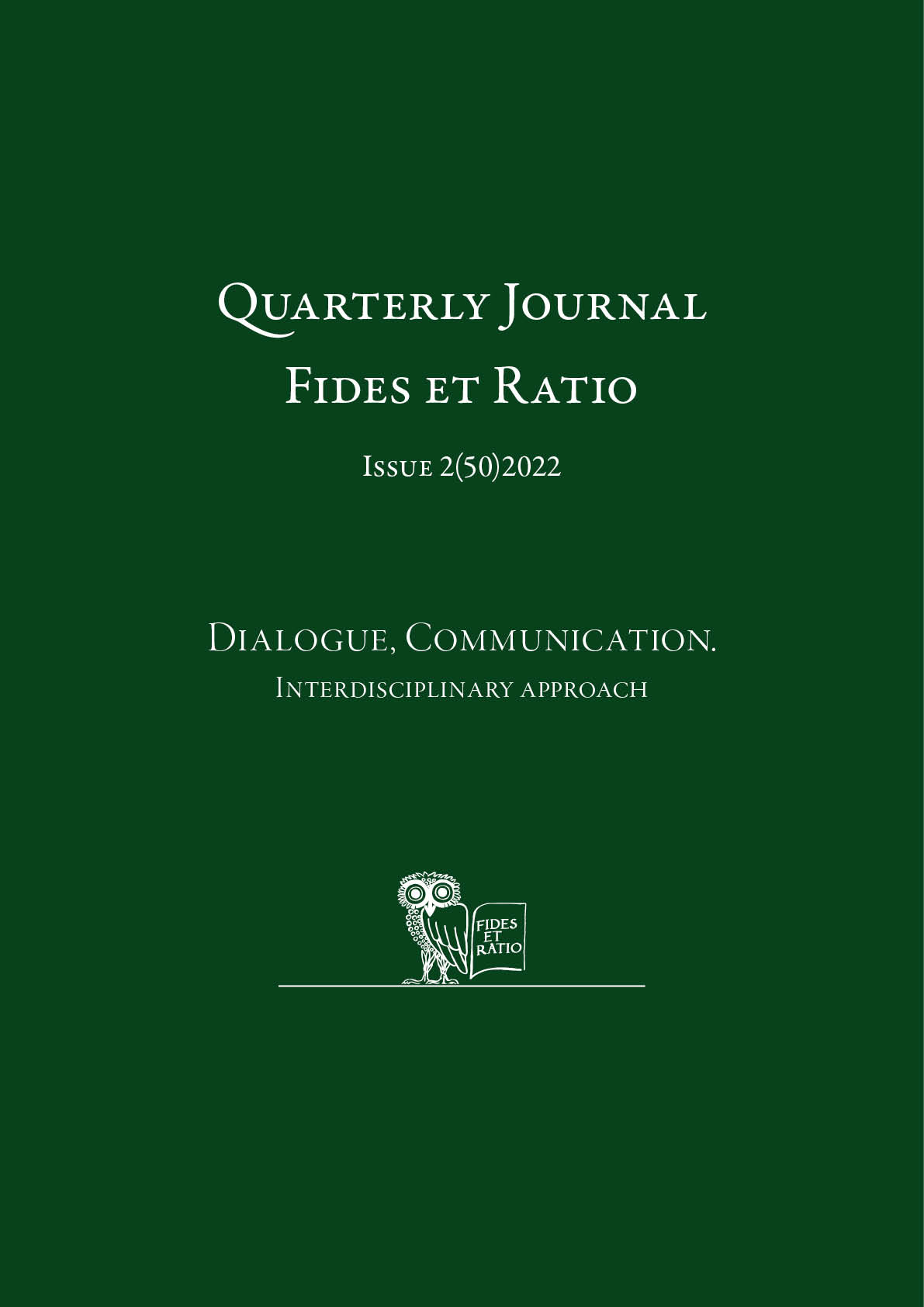Abstract
The aim of the study was to examine whether gender schemas differentiate marital communication and relationship satisfaction. Most analyses are conducted with reference to biological sex. Psychological gender distinguishes the construct of gender differences. The study involved 400 people (200 women and 200 men) who were married, economically active and had at least one child. The respondents completed the Marital Communication Questionnaire (KKM), the Masculinity and Femininity Scale (SMiK) and the Relationship Satisfaction Scale. The results obtained indicate
a differential role of gender schemas in terms of preferred conversational styles. Psychological gender does not affect relationship satisfaction. Furthermore, the gender patterns evident in the four psychological gender types differentiate the relationship of spouses' communication with their ratings of relationship satisfaction. To conclude, including the construct of psychological gender in the analyses is important from the point of view of research as well as practice. Firstly, it deepens knowledge on relationship satisfaction and communication in marriage, secondly, the knowledge gained may find practical application e.g. in marriage therapy.
References
Abramiuk, A., & Konopka, K. (2020). Zgodność między płcią psychologiczną partnerów, partnera idealnego i rzeczywistego a satysfakcja ze związku, Polskie Forum Psychologiczne, 25(2), 238-257.
Bem, S.L. (1974). The measurement of psychological androgyny, Journal of Consulting and Clinical Psychology, 42, 155–162.
Carlson, D.L., Miller, A.J., & Rudd, S. (2020). Division of Housework, Communication, and Couples’ Relationship Satisfaction, Socius: Sociological Research for a Dynamic World, 6, 1-17.
Chybicka, A., & Karasiewicz, K. (2009). Zadowolenie ze związku a długość trwania związku, zgodność opinii partnerów na temat stereotypowej roli kobiety w związku i jakość komunikacji, Psychologia Rozwojowa, 14(4), 33-43.
Dakowicz, A. (2021). Zadowolenie z małżeństwa. Pedagogiczne implikacje dotyczące osobistego rozwoju małżonków, relacji małżeńskich i rodzicielskich, Białystok: Wydawnictwo Uniwersytetu w Białymstoku.
Dakowicz, A., & Dakowicz, L. (2021). The quality of marital communication of spouses with a higher and lower level of satisfaction with their relationship. Kwartalnik Naukowy Fides et Ratio, 46(2), 129-141. https://doi.org/10.34766/fetr.v46i2.797
Hou, Y., Jiang, F., Wang, X. (2019). Marital commitment, communication and marital satisfaction: An analysis based on actor–partner interdependence model, International Journal of Psychology, 54(3), 369-376.
Jackson, J.B., Miller, R.B., Oka, M., & Henry, R.G. (2014). Gender differences in marital satisfaction: A meta-analysis. Journal of Marriage and Family, 76(1), 105–129. https://doi.org/10.1111/jomf.12077
Jankowska, M. (2016). Komunikacja pomiędzy małżonkami a ocena jakości związku małżeńskiego, Kwartalnik Naukowy Fides et Ratio, 28(4), 119-139.
Kaźmierczak, M., Plopa, M. (2005). Kwestionariusz Komunikacji Małżeńskiej (KKM). W: M. Plopa. (red.), Więzi w małżeństwie i rodzinie. Metody badań, 107-158. Kraków: Wydawnictwo Impuls.
Krok, D., & Lewoska, I. (2016). Płeć psychologiczna a zadowolenie ze związku małżeńskiego i własnego życia, Family Forum, 6, 59-78.
Kurzeja, T. (2018). Uprzedzenia związane z płcią a jakość związku małżeńskiego. Praca doktorska, Katowice: Uniwersytet Śląski.
Lipińska-Grobelny, A. (2006). Gender and styles of communicative behaviours. Acta Universitatis Lodziensis Folia Psychologica, 10, 95-105.
Lipińska-Grobelny, A. (2014). Zjawisko wielopracy. Psychologiczne uwarunkowania i konsekwencje, Łódź: Wydawnictwo UŁ.
Lipińska-Grobelny, A. (2016). Męskość, kobiecość, androgynia a relacje między życiem osobistym i zawodowym, Rocznik Lubuski, 42(1), 163-175.
Mandal, E. (2004). Podmiotowe i interpersonalne konsekwencje stereotypów związanych z płcią, Katowice: Wydawnictwo Uniwersytetu Śląskiego.
Mandal, E. (2020). Sacrifices of women and men in close relationships: the types and structure of sacrifices. The approach and avoidance motives for making sacrifices. Current Issues in Personality Psychology, 8(4), 317-328. https://doi.org /10.5114/cipp.2020.101952
Miluska, J. (2018). Małżeństwo w perspektywie badań międzykulturowych, Edukacja międzykulturowa, 8(1), 42-60. https://doi.org/10.15804/em.2018.01.03
Plopa, M., Rostowski, J. (2005). Kwestionariusz Dobranego Małżeństwa (KDM-2). W: M. Plopa (red.), Więzi w małżeństwie i rodzinie. Metody badań. 51-104, Kraków: Oficyna Wydawnicza Impuls.
Rostowski, J. (2009). Współczesne przemiany rozumienia związku małżeńskiego. W: T. Rostowska (red.), Psychologia rodziny. Małżeństwo i rodzina wobec współczesnych wyzwań. 15-46, Warszawa: Difin.
Ryś, M. (1999). Psychologia małżeństwa w zarysie, Warszawa: Centrum Metodyczne Pomocy Psychologiczno-Pedagogicznej MEN.
Starr, C.R., & Zurbriggen, E.L. (2017). Sandra Bem’s gender schema theory after 34 years: A review of its reach and impact. Sex Roles: A Journal of Research, 76(9-10), 566–578. https://doi.org/10.1007/s11199-016-0591-4
Walęcka-Matyja, K., & Szkudlarek, A. (2019). Psychologiczne predyktory zadowolenia z bliskiego związku interpersonalnego. Rola komunikacji emocjonalnej. Kwartalnik Naukowy Fides et Ratio, 38(2), 50-73. https://doi.org/10.34766/fetr.v2i38.66
Wysota, M. (2015). Satysfakcja małżeńska i percepcja stylu komunikacji partnera wśród polskich dorosłych będących w związku małżeńskim, Annales Universitatis Paedagogicae Cracoviensis Studia Psychologica, 8(1), 163–167. https://studia-psychologica.up.krakow.pl/article/view/5620

